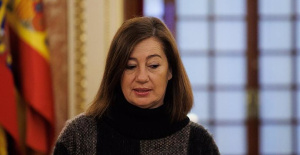MADRID, 28 Dic. (EUROPA PRESS) -
A Constitutional Court (TC) with a progressive majority will study the appeals against the reforms that concern the General Council of the Judiciary (CGPJ) and the TC itself, against the Catalan law that eliminates the 25% quota for Spanish in the classroom, or against abortion law.
With the entry of the Government candidates -former minister Juan Carlos Campo and the former general director of the Ministry of the Presidency Laura Díez- and of the CGPJ -the magistrate of the Supreme Court César Tolosa and the retired magistrate María Luisa Segoviano-, changes the board of majorities in the TC. Until now, the court included 6 magistrates from the conservative block and 5 from the progressive block. The new scenario will change to favor the progressive wing, which will manage to gather 7 magistrates. The conservatives will keep 4.
With this change, the focus is on the response that the TC gives to the appeals presented by Vox and PP against the two reforms operated in recent years on the Organic Law of the Judiciary (LOPJ). The first, in March 2021, prohibited an expired CGPJ --like the current one-- from making discretionary appointments in the high courts, while the second, last July, returned to the Council its power to appoint its two candidates to the TC .
The first reform was challenged by both Vox and PP. Both appeals were admitted for processing but the ruling is still pending. The 'popular' appeal against the second amendment is in the same situation. Some voices had urged the TC to resolve these challenges to clear up doubts in the context of the crisis generated around the CGPJ, although sources from the court of guarantees underline the need to keep the TC out of political noise.
At the end of the year, PP and Vox also appealed two amendments incorporated into the bill that repeals the crime of sedition and reforms that of embezzlement, by which the majority with which the CGPJ elects its two candidates for the TC and The barriers were removed so that the two Government candidates could take office without waiting for the two from the Council.
The Constitutional Court, after two extraordinary plenary sessions in barely a week, admitted the PP's appeal and the precautionary measures it included for processing, suspending the parliamentary processing of both amendments, which meant excluding them from the legislative proposal, which was finally approved without them on past December 22.
The appeal of those from Santiago Abascal, still pending whether or not it is admitted for processing, is much broader because it is directed not only against those two amendments but also against the entire bill, due to its form of parliamentary processing, express and without reports from the advisory bodies --CGPJ, Fiscal Council, Council of State--.
The 'popular' appeal against these amendments gave rise to an unprecedented decision on December 19: the urgent suspension of the parliamentary process in the Cortes Generales. Never before, in its more than 40-year history, has the court stopped a debate and a vote in the national Parliament.
These amendments contained a reform of the LOPJ and the Organic Law of the TC (LOTC) aimed at unblocking the renewal of the court itself. It was on June 12 when the mandate of 4 of its 12 magistrates expired --Pedro González-Trevijano, Juan Antonio Xiol, Antonio Narváez and Santiago Martínez-Vares--, the third that the Constitution mandates to replace the Government and CGPJ, with two each.
The objective of the aforementioned reform was, on the one hand, to lower the majorities so that the Council elects its two candidates for Constitutional and, on the other, to remove the obstacles so that the two nominees by the Executive -- former minister Juan Carlos Campo and the former high office of Moncloa Laura Díez-- could take office as TC magistrates without waiting for the CGPJ duo.
Other appeals awaiting a ruling in the Constitutional are those presented by Vox, the PP and Alberto Casero against the president of Congress, Meritxell Batet, for the vote of February 3, 2022 on the labor reform, which went ahead by 175 votes. in favor compared to 174 against, the key being the one issued electronically by the 'popular' deputy, who by mistake joined the yeses.
Both Vox and the PP maintain that Batet's decision not to allow Casero to vote in person, to correct his mistake, meant "stealing the popular will." Subsequently, a report by the lawyers of the Congress determined that the telematic vote of the deputy was valid, ruling out a computer error and thus pointing to human error.
The TC has also admitted but not resolved the challenges of the Madrid government of Isabel Díaz-Ayuso and Vox against the energy saving decree approved last August, which limits the heating and cooling temperature to 19 and 27 degrees Celsius, respectively, in buildings of public administrations, commercial establishments, cultural spaces or transport.
The Constitutional Court also has on the table the appeals of the PP and Citizens against the Catalan law that circumvents the sentence handed down by the Superior Court of Justice of Catalonia (TSJC) that reaffirms the obligation that at least 25% of the classes in Catalonia be in Spanish. Vox also appealed but its challenge was not admitted for processing due to a formal defect. ABORTION, EUTHANASIA AND THE CELÁA LAW
At the social level there are also several pending decisions. The court of guarantees admitted the appeals of PP and Vox against the law that regulates euthanasia, which allows patients who request it to be practiced and who have a "serious, chronic and disabling condition or a serious and incurable illness, causing intolerable suffering ".
Pending the decision of the TC, Vox argued that the law is unconstitutional because, in his opinion, the State has the "first obligation" to defend life, it cannot become "an accomplice of death", while the then PP de Pablo Casado explained that, with "125,000 deaths from coronavirus", June 2021 was not the "best time to address" this issue.
The Constitutional Court's response to the appeal filed in 2010 by the PP against the abortion law promoted by the Government of José Luis Rodríguez Zapatero is also awaiting, which involved implementing a system of deadlines, to which a Vox appeal against the law that penalizes the harassment of women who go to clinics for the voluntary termination of pregnancy.
Likewise, the response to Vox's challenge against the Law for the Protection of Children and Adolescents is still pending. Those of Santiago Abascal criticize the inclusion of the obligation that all minors receive "affective sexual education", a measure that -they say- "incorporates a state ideology in which it is necessarily intended to indoctrinate students".
There is also no resolution on the admitted resources of Vox and PP against the new educational law, the LOMLOE, also known as the Celaá Law - the minister who promoted it -. Casado described the norm as "an attack against freedom" and against the quality and unity of the educational system. Specifically, he made it ugly that he attacks Spanish as the vehicular language throughout Spain, that it allows "passing the course with more failed subjects" and that prevents choosing an educational center.
On the other hand, the Constitutional Court has yet to resolve the two amparo appeals filed by the defense of former Podemos deputy Alberto Rodríguez against the Supreme Court (TS) ruling and against the loss of the seat. The Prosecutor's Office has been in favor of granting him protection for the latter, but not for the conviction.

 Exploring Cardano: Inner Workings and Advantages of this Cryptocurrency
Exploring Cardano: Inner Workings and Advantages of this Cryptocurrency Seville.- Economy.- Innova.- STSA inaugurates its new painting and sealing hangar in San Pablo, for 18 million
Seville.- Economy.- Innova.- STSA inaugurates its new painting and sealing hangar in San Pablo, for 18 million Innova.- More than 300 volunteers join the Andalucía Compromiso Digital network in one month to facilitate access to ICT
Innova.- More than 300 volunteers join the Andalucía Compromiso Digital network in one month to facilitate access to ICT Innova.-AMP.- Ayesa acquires 51% of Sadiel, which will create new technological engineering products and expand markets
Innova.-AMP.- Ayesa acquires 51% of Sadiel, which will create new technological engineering products and expand markets Putin begins his fifth term demanding the "security" and "unity" of Russia
Putin begins his fifth term demanding the "security" and "unity" of Russia Almeida points to the death of two workers after being trapped under an 8-ton slab in Madrid
Almeida points to the death of two workers after being trapped under an 8-ton slab in Madrid Armengol and two former senior officials from the Balearic Islands, summoned by the Congressional commission on masks
Armengol and two former senior officials from the Balearic Islands, summoned by the Congressional commission on masks Puente assures that if he had known the impact of his words on Milei he would not have said them
Puente assures that if he had known the impact of his words on Milei he would not have said them How Blockchain in being used to shape the future
How Blockchain in being used to shape the future Not just BTC and ETH: Here Are Some More Interesting Coins Worth Focusing on
Not just BTC and ETH: Here Are Some More Interesting Coins Worth Focusing on They develop devices for the precise diagnosis of cancer patients
They develop devices for the precise diagnosis of cancer patients UMH researchers are working on a high-quality apricot crop that requires less irrigation water
UMH researchers are working on a high-quality apricot crop that requires less irrigation water The UPV develops an application to improve the quality of life of patients with glioblastoma
The UPV develops an application to improve the quality of life of patients with glioblastoma A sensor system obtains the fingerprint of essential oils and detects if they have been adulterated
A sensor system obtains the fingerprint of essential oils and detects if they have been adulterated A million people demonstrate in France against Macron's pension reform
A million people demonstrate in France against Macron's pension reform Russia launches several missiles against "critical infrastructure" in the city of Zaporizhia
Russia launches several missiles against "critical infrastructure" in the city of Zaporizhia A "procession" remembers the dead of the Calabria shipwreck as bodies continue to wash up on the shore
A "procession" remembers the dead of the Calabria shipwreck as bodies continue to wash up on the shore Prison sentences handed down for three prominent Hong Kong pro-democracy activists
Prison sentences handed down for three prominent Hong Kong pro-democracy activists ETH continues to leave trading platforms, Ethereum balance on exchanges lowest in 3 years
ETH continues to leave trading platforms, Ethereum balance on exchanges lowest in 3 years Investors invest $450 million in Consensys, Ethereum incubator now valued at $7 billion
Investors invest $450 million in Consensys, Ethereum incubator now valued at $7 billion Alchemy Integrates Ethereum L2 Product Starknet to Enhance Web3 Scalability at a Price 100x Lower Than L1 Fees
Alchemy Integrates Ethereum L2 Product Starknet to Enhance Web3 Scalability at a Price 100x Lower Than L1 Fees Mining Report: Bitcoin's Electricity Consumption Declines by 25% in Q1 2022
Mining Report: Bitcoin's Electricity Consumption Declines by 25% in Q1 2022 Oil-to-Bitcoin Mining Firm Crusoe Energy Systems Raised $505 Million
Oil-to-Bitcoin Mining Firm Crusoe Energy Systems Raised $505 Million Microbt reveals the latest Bitcoin mining rigs -- Machines produce up to 126 TH/s with custom 5nm chip design
Microbt reveals the latest Bitcoin mining rigs -- Machines produce up to 126 TH/s with custom 5nm chip design Bitcoin's Mining Difficulty Hits a Lifetime High, With More Than 90% of BTC Supply Issued
Bitcoin's Mining Difficulty Hits a Lifetime High, With More Than 90% of BTC Supply Issued The Biggest Movers are Near, EOS, and RUNE during Friday's Selloff
The Biggest Movers are Near, EOS, and RUNE during Friday's Selloff Global Markets Spooked by a Hawkish Fed and Covid, Stocks and Crypto Gain After Musk Buys Twitter
Global Markets Spooked by a Hawkish Fed and Covid, Stocks and Crypto Gain After Musk Buys Twitter Bitso to offset carbon emissions from the Trading Platform's ERC20, ETH, and BTC Transactions
Bitso to offset carbon emissions from the Trading Platform's ERC20, ETH, and BTC Transactions Draftkings Announces 2022 College Hoops NFT Selection for March Madness
Draftkings Announces 2022 College Hoops NFT Selection for March Madness




























